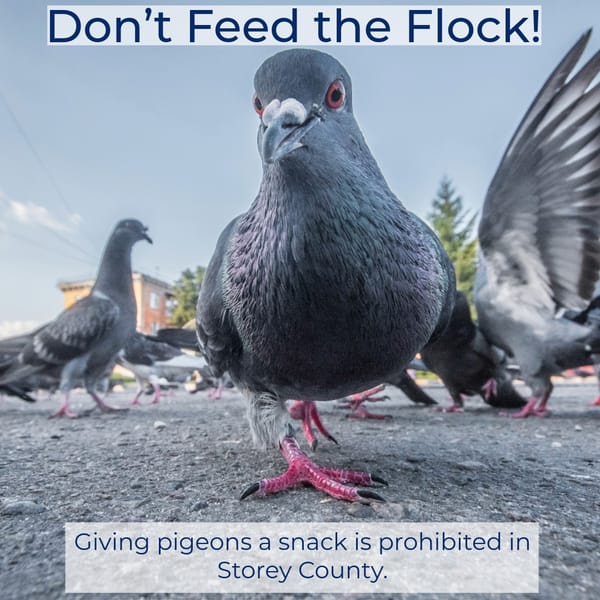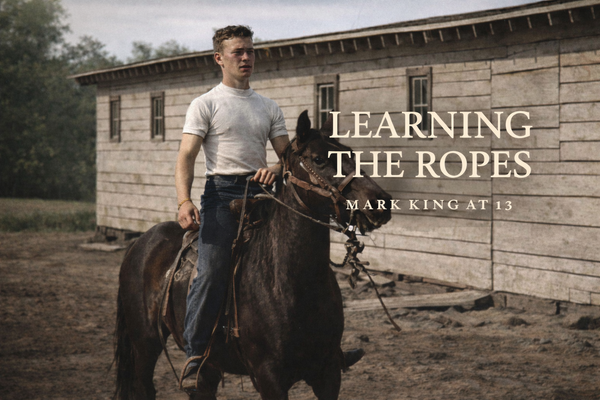King's Corner: The Horse in the Rotunda
When my dad was a boy, he brought a horse to school. That sounds like a setup for a joke — and in a way, it was — but to him, it was just another Tuesday.
He must’ve been eight or nine when his mother decided he was destined for the priesthood. My grandmother Julia was a force of nature, the kind of woman who could have organized the Exodus and still made it home in time to start supper. Dad, on the other hand, was a free-range child with an untamable curiosity and a suspicious relationship with authority. She marched him to the Catholic school, starched shirt, polished shoes, and a spirit already looking for an escape route.
The moment he stepped inside, he knew he was in trouble. “The nuns,” he told me years later, “didn’t walk — they floated. Like penguins on roller skates, with rosaries for seatbelts.” While his mother filled out forms, he slipped out the side door, thumbed a ride, and was halfway home before she caught him. The next day, she returned him by the collar and made sure he stayed put.
A few days later, during recess, a man pulled up with his wagon and horse to collect old items the school was throwing away — worn desks, broken chairs, anything that might be worth a few coins. While the man was inside, Dad and the other boys gathered around the horse. The dray stood patiently in the sun, enormous and gentle. Someone said, “I dare you to take him inside.”
“A dare,” Dad liked to say, “is just peer pressure with better advertising.”
So, he took the reins, whispered something encouraging, and started up the marble staircase. Ten steps. A landing. Eight more. The horse followed, slow and steady, probably wondering why education required so many stairs. When they reached the rotunda, Dad looked around proudly and thought, This will be one for the history books.
Then the bell rang. He went back to class. The horse stayed.
Holy Horseplay
It didn’t take long for pandemonium to erupt. The nuns found the horse standing in the rotunda like a living monument to bad judgment. One shrieked. Another fainted. The horse stood calmly, as if awaiting grades.
When Sister Bernardino finally cornered my dad, she was brandishing a heavy keychain like divine weaponry. “She came at me,” he said, “ready to rap my knuckles into next week.” He backed away, lost his footing on the slick marble, and tumbled down the stairs. When he stopped rolling, he realized he was holding something. It was Sister Bernardino’s wooden leg.
He stared at it in shock. She stared down at him in equal horror. Then, as he always told it, “I figured no good conversation starts with ‘Here’s your leg,’ so I ran.” He sprinted home, leg in hand, and hid under his bed until his mother found him.
Judgment Day
The next morning, she marched him back to school, mortified and furious, where Father Stone was waiting. The principal was a man of saintly patience — the kind usually learned through prolonged exposure to children. Two nuns flanked him like moral security guards as my grandmother and Dad entered his office.
“Son,” Father Stone began, “I hear an unusual story. Did you bring a horse into the school?”
“Yes, Father,” Dad said. “But he’s very well-behaved.”
The priest turned his chair around and went silent. Then his shoulders began to shake. When he faced them again, his eyes were watering. “We have to do something about this,” he said, struggling to sound stern. “I’m afraid it means a week’s suspension.”
“A week off school?” he said later. “That wasn’t discipline — that was divine mercy!”
What the Horse Taught Him
He loved telling that story — not because it made him look good (it didn’t) but because it revealed the truth he lived by: life is a blend of mistakes, laughter, and grace, and sometimes they show up all at once.
First: Never make big decisions when you’re tired or hungry.
“If I’d had lunch first,” he said, “that horse would’ve stayed outside.” Later, it became his rule for life: when everything feels impossible, start with food and a nap. His faith was practical — a theology of sandwiches and sleep.
Second: Self-pity is useless; laughter heals faster.
He could’ve spent that week sulking, but instead he laughed — and so did everyone else. The priest’s shaking shoulders stayed with him for life. “That’s when I knew heaven had a sense of humor,” he said. “And thank God for that, because I’ve given Him plenty of reasons to laugh.”
Third: Perspective changes everything.
At nine, it was catastrophe. At ninety, it was comedy. “If you live long enough,” he liked to say, “your worst disasters make the best stories.”
The Long View
As a kid, I thought it was just a hilarious story. As an adult, I see the quiet wisdom inside it. It’s not really about a horse or a nun or even a week off school. It’s about how my dad handled everything — with humor first, faith close behind, and an unshakable belief that grace can find its way through any mess.
When I hit hard times, I still hear his voice: “Don’t panic — we’ll get the horse down.” And somehow, things always work out in their own clumsy, miraculous way.
He wasn’t a preacher, but he lived like someone who’d had a long conversation with God and come away laughing. He believed laughter was holy medicine — that it could turn fear into humility and failure into story.
He always ended the tale the same way, grin crooked, eyes twinkling:
“The horse made it down eventually,” he’d say. “And so did I.”
And somehow, that line still makes everything — even the hard parts — a little easier to believe.



